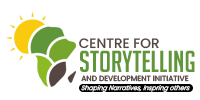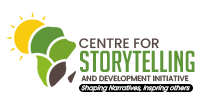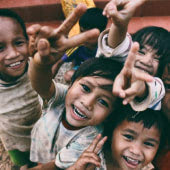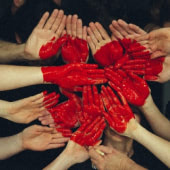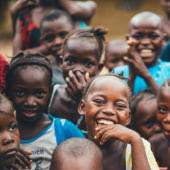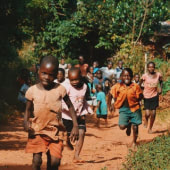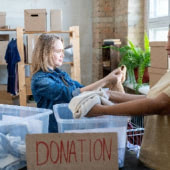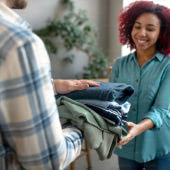Story Author: Phillip Anjorin
 Picture of students who benefited from the Initiative. Source: LinkedIn @Securecycle
Picture of students who benefited from the Initiative. Source: LinkedIn @Securecycle
Miracle Bankole, a student of Ebenezer African Methodist school in Ita-Oshi, was ecstatic when she got a free backpack made with jeans from the members of the SecureCycle Environmental and Climate Change Initiative (SECCI), better known as Securecycle in January. “Now, I don’t have to go around with the shame of carrying torn books anymore. Though I don’t have enough to buy textbooks, at least my notes are spared from daily damage,” she said.
If the jeans weren’t recycled by the organisation, it would have increased the 2 billion tons of municipal solid waste produced across the world annually, projected to increase by 70% in 30 years. Despite the clamour for environmental reform, Nigeria as a low-income country still grapples with landfills and municipal solid waste (MSW) indiscriminately disposed of and mismanaged. Every year, Nigeria generate at least 32 million tonnes of solid waste, emitting greenhouse gases and causing extreme weather conditions.
Even with constitutional provisions like Section 21 (s. 1-2) of the Federal Environmental Protection Agency Act, and the existence of environmental regulatory institutions like the National Environment Standards and Regulations Enforcement Agency (NESREA) with 24 state offices, only 31% of Nigeria’s population access safely managed sanitation. According to 2019 data from the World Bank, unsafe and unhygienic sanitation leads to a 71.7% mortality rate in the country.
Emmanuel Kilaso got inspired to advocate for climate reform during his undergraduate days studying Geological and Earth sciences at Ladoke Akintola University of Technology (LAUTECH), which led to the creation of SECCI and the jeans-to-bag initiative. His humble background encouraged him to prioritise students in low-income communities.
This organisation identify the schools where more students need bags and reaches out to the community through their leaders to donate old and discarded jeans materials for reuse. Before production begins, the jeans are washed, sterilised, and disinfected to prevent contamination. These jeans are soaked in treated water with bleach for hours, then rinsed and sun-dried.
The project thrives primarily on grants and donations from individuals and organisations’ generosity. He said, “Once we have the raw materials in hand, we kick off the next phase by actively seeking grants. These grants play a pivotal role in supporting our project and amplifying its impact. Every bit of contribution helps us turn old jeans into meaningful resources that benefit those in need.”

A call for support shared in 2021. Source: X.com/@seccimedia
Mohammed Taoheed, the organisation’s communications officer, said, “Our mission isn’t just about partnering with kids in underserved areas – it’s about standing with anyone facing life’s curveballs. While it may seem like we’re zeroing in on low-income communities, it’s because that’s where the heart of the challenge often lies. We’re all about lifting individuals, no matter where they are, and turning the odds in their favour by making a difference, one life at a time.”
Mr Taoheed revealed that the initiative has impacted more than 5,000 students in 20 schools since its inception in 2019. He said, “We’ve been on a roll and decided it’s high time to nail down the specifics. This year, our game plan includes getting the nitty-gritty details. In January, we kicked things off by teaming up with two schools and touching the lives of 63 awesome students.”
Other beneficiaries
Two siblings, Adewunmi Sekinat and Michael, trekked from long distances to school every day with spoilt schoolbags. Sometimes, they skip school days and miss out on class activities. But their story changed when their teacher, Olufunke Owoseni at Owu Africa Church School in Ita-Iyalode, reached out to the initiative for aid. Since then, the siblings always come to school without worrying about the distance.
She revealed how SecureCycle’s intervention made other student beneficiaries better. “One of my learners was not always concentrating in class and distracts his colleagues whenever they were writing, but he changed as soon as he got the bag. He had lost most of his books due to not having a bag so I had to plead with his parents to get him new exercise books when he was given the bag. He went from being troublesome to being one of the best students in mathematics and critical thinking.”
She said the day Mr Kilaso came with the bags, he explained the production process to the students and its value to environmental sustainability. “His explanation sparked up something in some of my learners as some of them started turning in jeans material that wasn’t of use anymore in their homes, some made toys from plastics and a few other wastes,” she said.
Rough sailing
Since the initiative began, it has encountered challenges in different forms. Mr Kilaso said, “We’re currently navigating some significant hurdles, particularly cultural beliefs that pose obstacles to clothing donations. There’s a prevalent concern that donated clothes could be used in harmful practices, hindering the amount of clothing we can recover. Instead of contributing to our cause, some choose to dispose of their clothes by burning them, using them as rags, or sending them to landfills.”
“As a non-governmental organization, our reliance on grants for project execution adds another layer of challenge. Financial constraints can impede the progress of our initiatives, limiting our ability to make a substantial impact.”
But he praised the volunteers of the initiative, who help bridge cultural barriers by encouraging others to donate their clothing and breaking down misconceptions by spreading awareness about the project and advocating for grants, which he described as a game-changer in overcoming financial constraints.
Carbon credit in Africa
The Kyoto Protocol, signed in 1997, established carbon credit and the green economy as a means to acknowledge and financially support individuals or organisations who take actions to reduce harmful gases, like planting trees or recycling waste products.
As they offset the environmental cost of carbon emissions, they earn credits that can be sold to other entities that may be contributing more to pollution. Despite being an environmental reward system, Africans are less familiar with carbon credit, let alone enjoy the initiative.
“What we lack is an active driving carbon market and what will make a carbon market exist is regulations that set carbon budgets for countries or companies or whatnot, which currently doesn’t exist,” said Tobi Oluwatola, the executive director of the Centre for Journalism, Innovation and Development (CJID). He said that a thriving market for carbon offsets will be difficult if measurements are not provided to reduce carbon emissions.
He revealed that social pressure has been the sole driving force behind carbon regulation for companies contributing immensely to carbon emissions. But some countries in Africa, like Senegal, Gabon and Ghana, are already enjoying dividends from the carbon market.
While praising projects like the African Carbon Market Initiatives (ACMI) that Yemi Osinbajo -Nigeria’s former vice president- spearheaded, Mr Oluwatola believed that African countries should also take the initiative of mining from the untapped potential in the carbon market individually.
He said, “Individual African governments need to be proactive in seeking bilateral agreements with countries looking to buy carbon credits. African countries like Gabon have made significant income from carbon credit by building their mangrove swamps and making bilateral deals with individual countries, especially in Europe where there are cap and trade policies.”
This report was first published through the African Change Narratives Fellowship on www.africanchangestories.org
